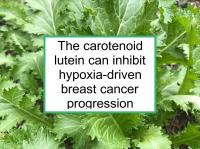Women who have substantial intake of carotenoids in their diets have lower risks of breast cancer and its recurrence than women with low intake. This appears to be especially true of women with dense breasts. Carotenoids are red, orange, and yellow pigments found in a variety of vegetables and fruits.
Included are alpha-carotene, beta-carotene, lycopene, beta-cryptoxanthin, lutein, and zeaxanthin, as well as some less well known carotenoids such as crocetin (found in saffron) and fucoxanthin (seaweed). Mixtures of carotenoids are often found together in the same plant. Although the evidence is inconsistent, supplementation with carotenoids does not appear to reduce breast cancer risk and might, in fact, increase it in some cases.
Now a new study has reported that lutein inhibits breast cancer progression under hypoxia, a low-oxygen condition in which solid breast tumors can thrive because it makes them highly invasive and treatment resistant.
Best food sources of lutein
The following foods are excellent sources of lutein and have also been linked to reduced risk of breast cancer and its recurrence:
Lutein inhibits breast cancer progression under hypoxia
The study referenced above was designed to investigate the role of lutein, a non-vitamin A carotenoid, in breast cancer cells under hypoxia conditions. To conduct the study, the authors evaluated lutein's involvement under hypoxia in the production of reactive oxygen species (ROS—molecules and free radicals derived from molecular oxygen), the activation of hairy and enhancer of split 1 (HES1) (genes that encode transcription repressors), and the proliferation, invasion and migration of ER+/PR+ and triple negative breast cancer cells.
Proliferation was found to be inhibited by lutein in a dose-dependent manner. Flow cytometry-based analysis demonstrated that apoptosis (programmed cell death) gradually increased as a result of lutein treatment under hypoxia. Lutein reduced hypoxia-mediated activation of genes favorable to breast cancer. Lutein also greatly reduced the invasion and migration of breast cancer cells under hypoxia. Production of ROS under hypoxia was also reduced by lutein. It was also demonstrated that lutein reduced HES1 expression during hypoxia, while increasing hydrogen peroxide (H2O2) levels.
The authors conclude that lutein might be a new candidate for the chemoprevention of breast cancer. In addition, the study results show that HES1 may be important in mediating the activities of lutein in the suppression of hypoxia-driven ROS-induced breast cancer progression.
